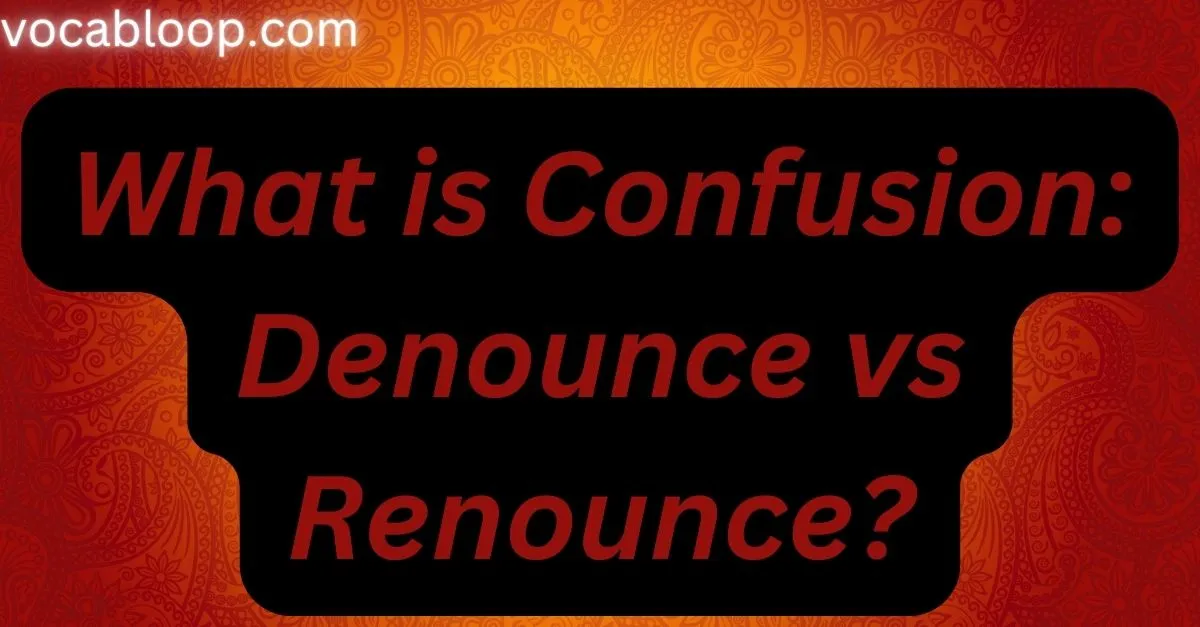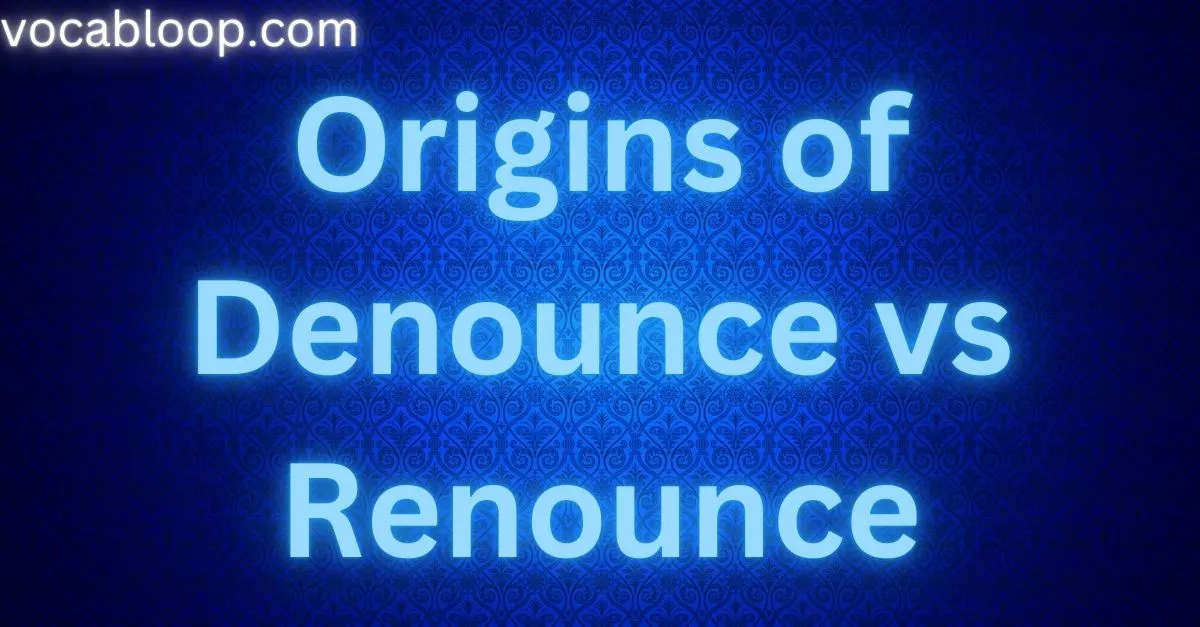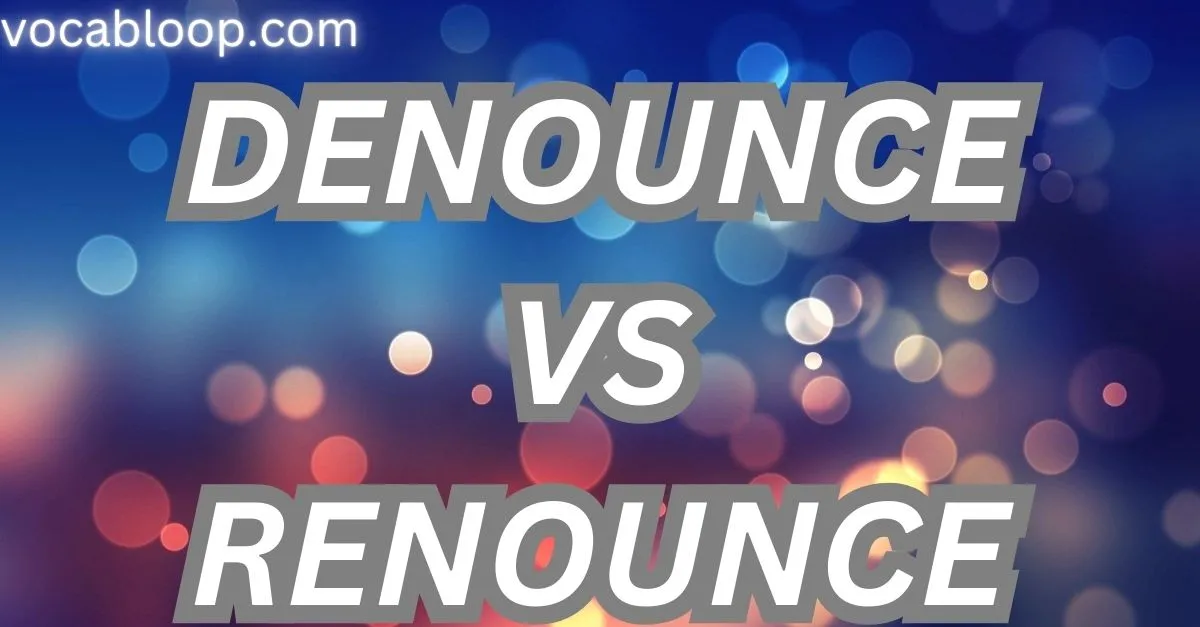The words denounce vs renounce are often confused due to their similar spelling and pronunciation. However, they hold distinct alternative meanings and serve different roles in communication. This article will explore the word difference, explain their usage, and provide grammar tips to avoid a confusing message.
Whether you’re writing a speech, drafting a letter, or having a discussion, understanding the distinction between these words ensures your public communication is clear and accurate. Let’s dive deeper into their definitions, origins, and common mistakes.
What is Confusion: Denounce vs Renounce?

The confusion arises because both words deal with rejection or disapproval. While denounce refers to publicly criticizing someone or something, renounce means to give up or abandon a claim, belief, or possession. The spelling difference between these words may seem minor, but their distinct interpretations can lead to a confusing expression when used incorrectly.
For example, “He denounced the policy in his speech,” and “She renounced her inheritance” have entirely different contexts. Understanding the public reproach in denounce and the act of officially relinquishing in renounce is key to avoiding lexical confusion and spelling errors.
What is Denounce?

Denounce refers to the act of publicly criticizing or condemning something or someone, especially to bring attention to wrongdoing or undesirable behavior.
It’s often used in situations where an individual or group is accused of immoral or illegal actions.
Is the word denounce correct?
Yes, the word denounce is correct and commonly used in contexts where public criticism or condemnation is needed. It is appropriate when expressing disapproval or highlighting negative aspects of a person’s actions or behavior.
Definition:
To denounce means to publicly declare something as wrong, evil, or unacceptable.
Meaning:
It involves publicly accusing someone of a wrongdoing or condemning certain actions in a formal way.
Usage:
- The government denounced the actions of the corrupt officials.
- She denounced the company for exploiting workers in her article.
What is Renounce?

Renounce means to formally reject or abandon something, such as a belief, right, title, or claim. It involves a deliberate and official decision to relinquish or give up something that once belonged to you.
Is the word renounce correct?
Yes, renounce is correct and widely used in contexts where someone formally gives up a right, title, belief, or claim, often in a legal or public manner.
Definition:
To renounce means to formally declare that you are giving up or abandoning something, such as a belief, title, or responsibility.
Meaning:
It refers to an intentional act of rejection or relinquishment, typically done in a formal or official context.
Usage:
- He renounced his citizenship after moving to another country.
- The leader renounced his power, choosing to retire from public life.
Quick Summary: Denounce vs Renounce
| Feature | Denounce | Renounce |
| Definition | Publicly criticize or condemn | Formally reject or abandon |
| Context | Political, legal, or social settings | Legal, personal, or religious acts |
| Example Sentence | “They denounced the new policy.” | “She renounced her royal title.” |
Denounce vs Renounce as Parts of Speech
Both denounce and renounce function as verbs. While denounce emphasizes verbal actions like public accusations, renounce focuses on formal acts of rejection. For example:
- Denounce: “They condemned the unfair practices.”
- Renounce: “He relinquished his claim to the property.”
Pronunciation of Denounce vs Renounce

While denounce and renounce sound similar, their pronunciation distinction lies in the stress on different syllables. Denounce is pronounced as dih-NOUNCE, with the stress on the second syllable. In contrast, renounce is pronounced as ree-NOUNCE, with the stress on the first syllable.
This subtle difference in stress helps differentiate the two words when spoken, even though they are often confused in writing. Being aware of the pronunciation can aid in clear, effective communication.
Denounce in British English and American English
The word denounce retains the same core meaning in both British and American English—to publicly criticize or condemn. However, its usage differs slightly between the two dialects. In British English, denounce is often seen in political contexts, where it refers to official condemnation of policies or actions.
On the other hand, in American English, it is more commonly used in public reproach or criticism of individuals or groups, particularly in media or social discussions. While both dialects maintain the essence of the word, the contexts in which it is applied reflect cultural and social differences.
Renounce in British English and American English
Renounce is consistent in meaning but varies in application depending on the region. In American English, it is often used in legal or political contexts, such as relinquishing rights, titles, or affiliations. For example, a person might renounce citizenship or membership in an organization.
In British English, the word is more frequently applied in historical or royal contexts, often relating to abdication or disavowing royal duties or titles. This distinction highlights how language can adapt to different societal norms and uses across cultures.
Common Mistakes and How to Avoid Them
The most common mistake people make with denounce and renounce is using them interchangeably, despite their distinct meanings. While denounce involves public criticism or condemnation, renounce focuses on formal rejection or relinquishment. This confusion often leads to unclear messages or grammar errors in writing.
A reliable grammar guide or language tips can help clarify their proper usage. Additionally, being mindful of spelling variations prevents orthographic errors, ensuring your communication remains precise and professional in both formal and informal contexts.
Trick to Remember the Difference Denounce vs Renounce
Denounce can be thought of as “declare negatives”, as it involves publicly pointing out flaws or criticizing wrongdoing. On the other hand, renounce works as “reject rights”, emphasizing the act of formally abandoning a claim, belief, or responsibility.
This simple mnemonic ties their meanings to their actions, making it easier to distinguish between them. By keeping this in mind, you can avoid muddled communication and use these words confidently in the right context.
Origins of Denounce vs Renounce

Denounce
The word denounce originates from the Latin term “denuntiare”, which means to bring formal news or announce, often with a sense of warning or blame. Historically, it carried the connotation of making public accusations or warnings about wrongdoing, particularly in political or legal contexts.
Over time, the term evolved into its modern meaning: publicly criticizing or condemning someone or something. Its evolution reflects its consistent association with formal or public communication, especially when highlighting negative aspects or flaws.
Renounce
The word renounce is derived from the Latin root “renuntiare”, which translates to retract or abandon. It originally implied giving up something formally or announcing rejection of claims, beliefs, or responsibilities.
Today, it is commonly used in contexts involving official rejection of ties, rights, or ideas, often signaling a deliberate and formal act of relinquishment.
Synonyms of Denounce vs Renounce
Denounce
- Condemn
- Accuse
- Blame
- Criticize
- Reject
- Oppose
- Censure
- Reproach
- Decry
- Castigate
Renounce
- Relinquish
- Reject
- Disown
- Abdicate
- Resign
- Forsake
- Waive
- Surrender
- Renegade
- Quit
Sentences in Daily Usage of Denounce vs Renounce
Denounce
- The activist denounced the government’s negligence in handling the crisis.
- He criticized the company for its unethical practices.
- The community leaders denounced the rise of violence in their area.
- She condemned the discriminatory policies during her speech.
- The report denounced widespread corruption within the agency.
- He publicly accused the politician of lying to voters.
- The opposition criticized the budget for ignoring social issues.
- The documentary denounced human trafficking as a global threat.
- They condemned the use of force against protesters.
- The professor criticized the outdated teaching methods used by the school.
Renounce
- She formally renounced her claim to the throne.
- He relinquished his parental rights in court.
- They disowned their connection to the controversial group.
- He renounced violence as a means of achieving goals.
- The actor rejected the harmful stereotypes perpetuated in media.
- She renounced her old habits and embraced a healthier lifestyle.
- The king abdicated his throne to live a simpler life.
- They waived their right to compensation during the settlement.
- He publicly rejected the outdated traditions of his community.
- The leader relinquished his power for the sake of peace.
FAQs
What does it mean to denounce someone?
To denounce someone is to publicly criticize or accuse them of wrongdoing. It involves formal condemnation or an accusatory statement, often in social or political contexts.
Can you renounce a belief informally?
Yes, you can informally renounce a belief by stating you no longer accept or follow it. However, formal contexts like legal or religious settings typically require an official declaration.
What are the different contexts for these words?
Denounce is used in public accusations or criticism, while renounce applies to formally rejecting rights, titles, or beliefs. They belong to different social, political, and personal spheres.
Why are these words often confused?
Both words deal with rejection or disapproval and have similar spellings. The confusing message arises from their overlap in tone, but their meanings are distinct.
Are there regional differences in their usage?
Not significantly. Both words hold similar meanings in British and American English, though denounce is more common in political discourse, while renounce is prevalent in legal and personal contexts.
Conclusion
Understanding denounce vs renounce is key to avoiding linguistic confusion and improving communication. Denounce involves publicly criticizing or accusing someone or something, often highlighting their flaws or negative aspects. In contrast, renounce focuses on formally rejecting or relinquishing claims, beliefs, or ties, often through an official declaration.
Their distinct meanings make them suitable for different contexts, such as political criticism for denounce or personal decisions for renounce. Mastering these terms ensures clarity in writing and speaking, enabling you to express ideas more confidently and accurately in everyday situations.

Alex Hormozi is a seasoned blogger at Vocab Loop, known for his deep insights into language, vocabulary, and grammar. With years of experience in writing, Alex shares practical tips and effective strategies to help readers improve their linguistic skills and enhance their writing abilities.

